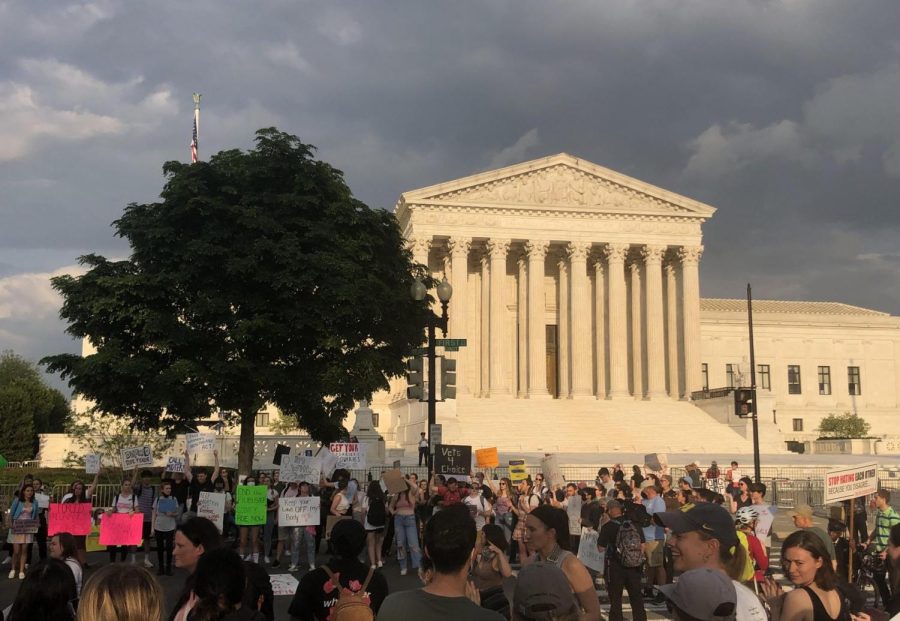Leaked SCOTUS Draft Highlights Dangers of Voter Abstention
In the 98-page initial draft of the Supreme Court opinion to overturn Roe v. Wade, leaked by POLITICO May 2, Justice Samuel Alito writes, “We hold that Roe and Casey must be overruled. The Constitution makes no reference to abortion, and no such right is implicitly protected by any constitutional provision.” I could spend the rest of this piece refuting this interpretation, which has no basis in the Constitution and is motivated solely by ideology, but instead, I want to connect this to the concept of anti-electoralism, specifically in reference to the 2016 election.
Anti-electoralism is the practice of abstaining from voting during elections where one feels there is no ideal candidate and encouraging others to do the same — usually framed as taking the moral high ground. In 2016, many Americans with leftist political views refused to vote for Hillary Clinton. These individuals, who often identified with the motto “Bernie or Bust,” refused to vote for a candidate they felt didn’t embody their values. I understand this view very well. In fact, I used to espouse it myself, having felt similarly about Joe Biden in 2020. When considering how ineffective the Democratic Party is at combating Republican attacks on democracy and fundamental rights — including the right to privacy, which provides the basis for the right to abortion — advocating and voting for the relatively less harmful party can be a difficult pill to swallow.
It’s true that Democrats have held supermajorities in Congress many times since the Roe v. Wade ruling and had opportunities to codify the right to abortion into federal law, but they didn’t. Though we can’t get into the minds of Democratic political strategists, it wouldn’t surprise me if this inaction was motivated by political interests. Leaving the issue of abortion to the Court allowed the Democratic establishment to scare their voter base into voting for and donating to them. This is still happening today: Democrats are using this leaked opinion to fuel a massive fundraising initiative. A recent campaign email from Speaker of the House of Representatives Nancy Pelosi read, “The only way to protect reproductive rights is to build on our Democratic majorities in the House and Senate and DEFEAT every last anti-choice Republican who made this happen. I need a ONCE-IN-A-LIFETIME response — 50,000 gifts in the next 24 hours — to put us in a position to win this fight and protect our fundamental rights.” At the time this piece was written, Democrats had raised more than $7 million since the opinion was leaked. So while it is true that Democrats have chosen political expediency over the well-being of their constituency, choosing not to vote at all can have even more serious consequences.
An article published in January 2017 by FiveThirtyEight suggested that low voter turnout “likely cost Clinton the election.” It noted that, according a poll of 100,000 people, 35 perent of self-identified Democrats and 33 percent of self-identified independents who were registered to vote did not, as opposed to 32 percent of self-identified Republicans. While this may not seem like a massive difference, it is important to remember that in some states, Trump won by less than half of a percentage point.
It is clear that anti-electoralism has at least partially contributed to the situation we are currently facing. As we stand on the precipice of Roe being overturned, we must consider the facts. Not turning out to vote for Hillary Clinton and instead choosing to stay home facilitated the election of former President Donald Trump. During Trump’s single term in office, he nominated three conservative justices who were appointed to the Court — Neil Gorsuch, Brett Kavanaugh, and Amy Coney Barrett — cementing a conservative majority court for decades to come that is now undercutting more than 50 years of Supreme Court precedent and stripping reproductive health care and bodily autonomy away from millions of Americans. If Hillary Clinton had won, those justices would not currently be serving on the Supreme Court. Choosing not to vote is a luxury. It indicates that one won’t be severely impacted by the decisions made by one’s representatives.
As a cisgender, heterosexual, white man, my fundamental rights have never been on the chopping block. For me, voting or not voting isn’t about taking the moral high ground. It’s about being able to look someone in the eye, someone who isn’t white, or straight, or financially stable, and say that I care whether they have the right to bodily autonomy, the right to marry whom they love, and the right to not be denied health care due to a preexisting condition. I hope when you step into the ballot box, you consider the power you have. In 2016, Donald Trump won the state of Michigan by an average of two votes per precinct.
The right to abortion was grounded in the right to privacy. That is the same right that was used to affirm the constitutionality of sodomy and contraception, so given our trajectory, we shouldn’t get too comfortable with the legality of those either. The central holding of Roe v. Wade has been reaffirmed five times, yet we are likely to witness its reversal next month. Refusing to vote in upcoming elections will have dire consequences, and rights previously considered untouchable could be left to the states to uphold or overturn.
Many people say that instead of voting, you should just organize and protest, but I fail to understand why the two are mutually exclusive. So get out there, go to protests, and make your voice heard. But when the midterm elections come this fall and the presidential election comes in 2024, I implore you to get out and vote. Even if you’re like me and your rights aren’t in question, the rights of those you care about certainly are.



